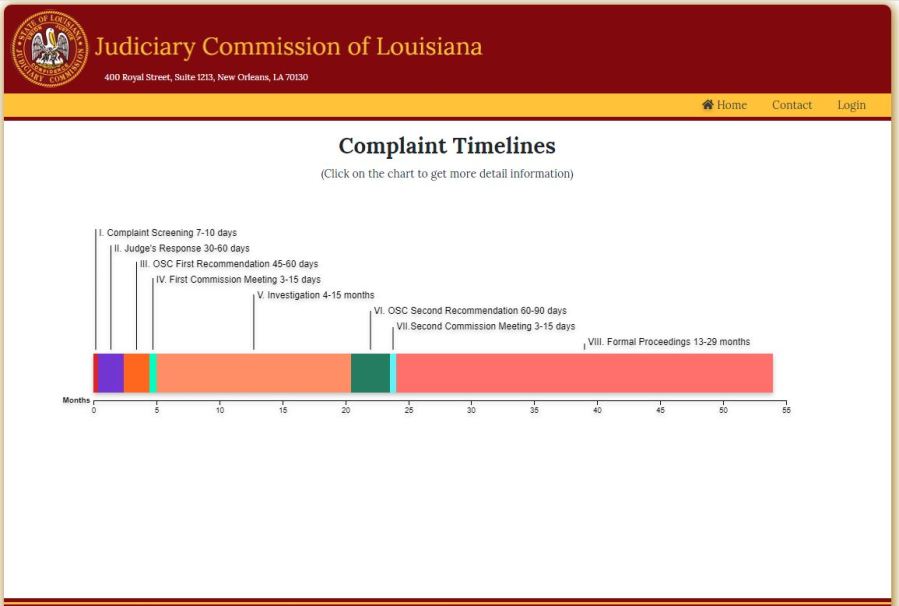LAFAYETTE, La. (KLFY) — Since a judicial complaint has been submitted against Judge Michelle Odinet following a video leaking with racial slurs, we are asking the question “What happens next?”
The Louisiana Constitution says any public officer, except judges, may be recalled. It’s been that way since 1921. The only way a judge can be suspended, censured, or removed apart from their resignation, is through the Louisiana Supreme Court.
Before any disciplinary action can be taken by the Louisiana Supreme Court, it must be recommended by the Judiciary Commission of Louisiana. The nine-member commission consists of three judges, three attorneys, and three citizens, and any commission decisions require five votes.
State Senator Gerald Boudreaux filed a judicial misconduct complaint form to launch the process, something any citizen can do with this form.
“It’s my goal, and it’s my objective to get this investigation. Let’s find out and let’s see what options are on the table,” Boudreaux told News 10. “I trust the system. I trust the process, so my emphasis is to get it started.”
A complaint against a judge must contain facts and allegations that if proven to be true show the judge has engaged in unethical conduct and violated the Code of Judicial Conduct and/or the Louisiana Constitution.
For example, the Code of Judicial Conduct states, “A judge…shall personally observe, high standards of conduct so that the integrity and independence of the judiciary may be preserved.” and “A judge shall perform judicial duties without bias or prejudice.”
Protocol for a judicial misconduct complaint is that it will be screened for the next week with a judge’s response required up to two months after that. According to the Judiciary Commission, the full investigation and Supreme Court Ruling could take anywhere from a year and a half to well over four years.

However, the Louisiana Supreme Court told News 10 in a statement, “If the Judiciary Commission has substantial credible evidence of an ethical violation, and the judge may pose a substantial threat of serious harm to the public or the administration of justice, then the Judiciary Commission may recommend to the Supreme Court that the judge be interimly disqualified while the matter is pending.”
You can read the full statement from the Louisiana Supreme Court below:
“Without commenting on any specific matter that could come before the Louisiana Supreme Court, but merely in an effort to aide our citizens in understanding the judicial disciplinary process in Louisiana, I can provide the following information.
It should be understood that neither the Supreme Court nor Justices or Judges can ethically comment on any matter that could possibly be subject to proceedings before a court. Providing this information is not to be considered as related to any pending or future matter.
Please be aware that complaints against judges are not filed with the Louisiana Supreme Court, but instead are filed with the Judiciary Commission of Louisiana, a separate constitutionally-created body that has the authority to evaluate, investigate, and make recommendations regarding the misconduct of judges that involves violations of the Code of Judicial Conduct or the Louisiana Constitution. The Judiciary Commission is composed of three judges, three attorneys, and three members of the public who are not judges or attorneys.
Under the Louisiana Constitution, the Louisiana Supreme Court cannot discipline a judge (including removal from office) unless it first receives a recommendation from the Judiciary Commission of Louisiana, which may only occur after an investigation by the Commission and an evidentiary hearing before the Commission. These hearings are open to the public.
Pursuant to the Louisiana Constitution and Supreme Court rule (Rule XXIII, Section 23), Judiciary Commission documents and proceedings are confidential through the investigatory stages of the proceedings, much like evaluations made by grand juries are confidential. Because of this confidentiality and, consequently, because information concerning complaints is not shared by the Judiciary Commission with the Supreme Court or its staff, we have no information to confirm or deny the existence (or not) of any complaint. The Judiciary Commission’s website also provides answers to commonly asked questions.
Prior to the Judiciary Commission of Louisiana filing a Recommendation for Discipline with the Supreme Court, which is done upon conclusion of Judiciary Commission proceedings, there may be occasions where interim disqualification is warranted. In that case, the Commission may choose to ask the Court to immediately disqualify a judge from exercising any judicial function pending further proceedings before the Judiciary Commission or the Court. If a judge has been indicted or charged with a serious crime under state or federal law or if the Judiciary Commission has substantial credible evidence of an ethical violation, and the judge may pose a substantial threat of serious harm to the public or the administration of justice, then the Judiciary Commission may recommend to the Supreme Court that the judge be interimly disqualified while the matter is pending. A judge may also consent to interim disqualification. The procedures for interim disqualification are detailed within Louisiana Supreme Court Rule XXIII, Section 27.
Louisiana Supreme Court Rule XXIII, Section 27 provides that the filing of a recommendation for interim disqualification be made under seal. The rule further states “[i]n the event the Court orders the interim disqualification of a judge, the Commission’s recommendation, any opposition, and the Order of Interim Disqualification shall be matters of public record, unless otherwise ordered by the Court.” Thus, once the Court issues an Order interimly disqualifying a judge during the pendency of ongoing disciplinary proceedings, that Order and the Commission’s motion and opposition become public, unless the Court chooses to issue the Order under seal.”
Robert Gunn
Louisiana Supreme Court Deputy Judicial Administrator/Community Relations
